The 10 Best All-Season Tires in Canada
By Arthur Dubois | Published on 03 Oct 2023
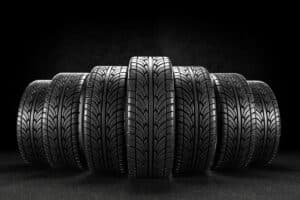
Canada’s widely varying weather can be a slog for drivers because it forces them to keep changing tires. When summer ends, the winter tires (or at least some snow-ready chains) have to go on, only to be switched out again once the roads clear and the weather dries up.
It’s a hassle.
And that hassle is likely part of the reason why you’re considering all-season tires. The marketing behind these tires suggests you can use them throughout the year. That’s not technically true (several provinces have restrictions in place), but the convenience promised has put you on the hunt for the best all-season tires Canada offers. This list gives you 10 of them.
Toyo Celsius CUV – Best All-Round All-Season Tires
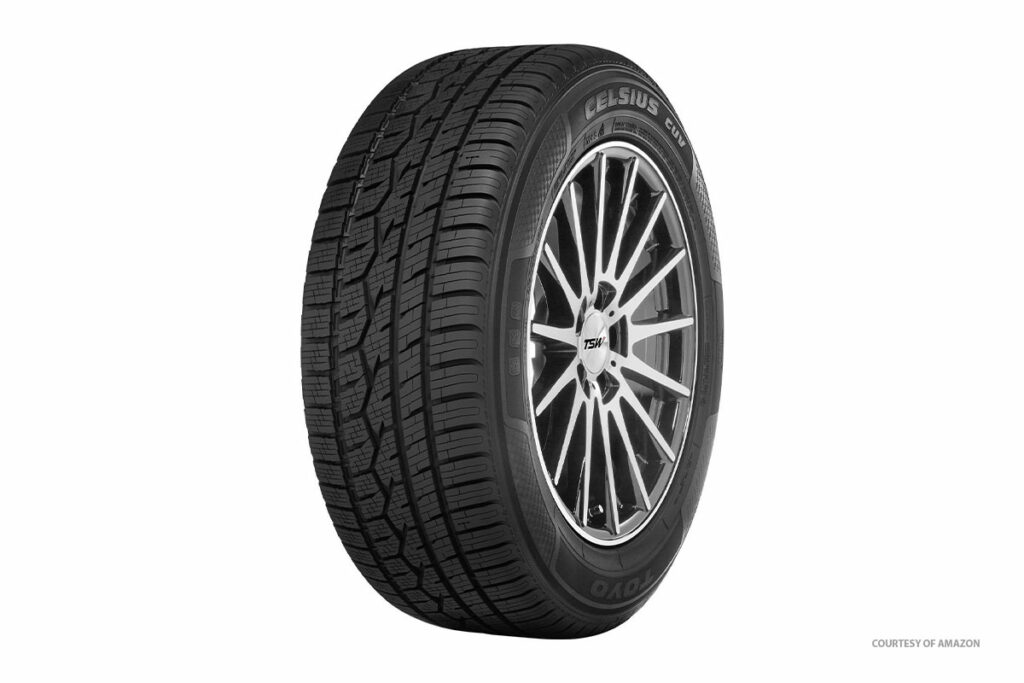
With a rim size of just over 43cm and solid tread depth, the Toyo Celsius CUV offers a good choice for Canadians operating on a budget who still want a decent performance tire. They come with a 60,000-mile warranty (approx. 96,560km), too, meaning Toyo has confidence enough to cover them for the generally accepted average life of an all-season tire.
The slush grooves are a highlight, as they increase traction in snowy conditions, and they provide a comfortable ride assuming the weather isn’t too extreme.
Price: $279.14
Rating: 5/5
Firestone WeatherGrip – Best for Extreme Weather
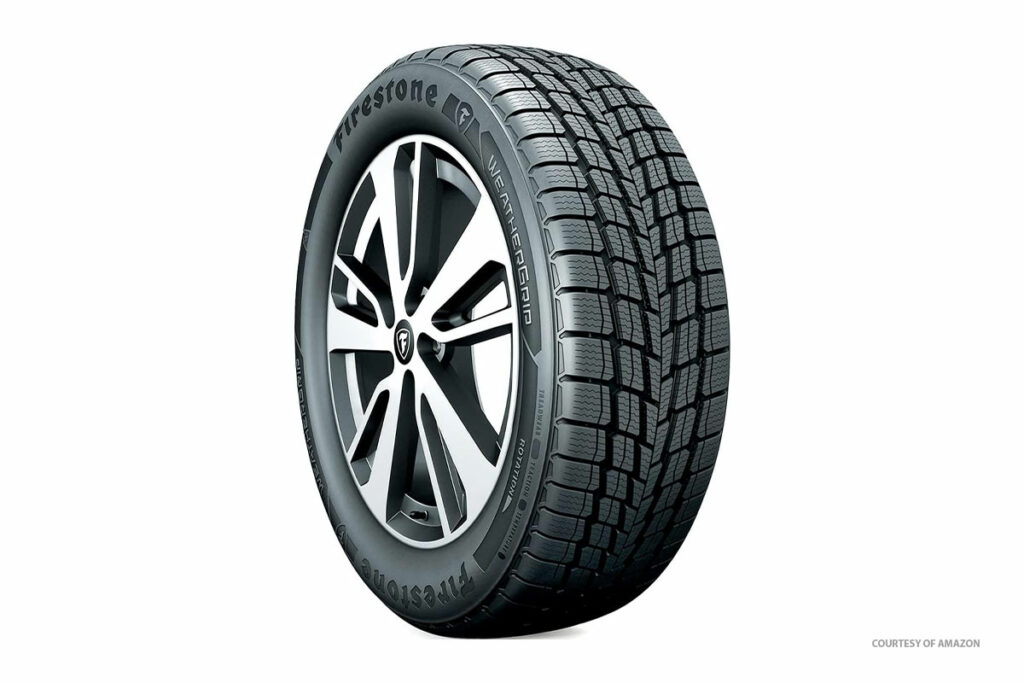
Technically, the Firestone WeatherGrips are all-weather tires, rather than all-season ones, but you’ll appreciate them for their versatility. Equally capable of handling snow, rain, and extremely dry conditions, the tires come with a 65,000-mile limited warranty (almost 105,000km), so they’re guaranteed to be a little longer lasting than most other all-season tires.
You may need that warranty, too, if you’re one of the unfortunate customers who discover early wear in the tire. But, for the most part, these are the best choices for dealing with extremes in weather without resorting to full winter tires.
Price: $514.16
Rating: 4.6/5
Continental PureContact LS – Best All-Season Tire for Consistent Grip
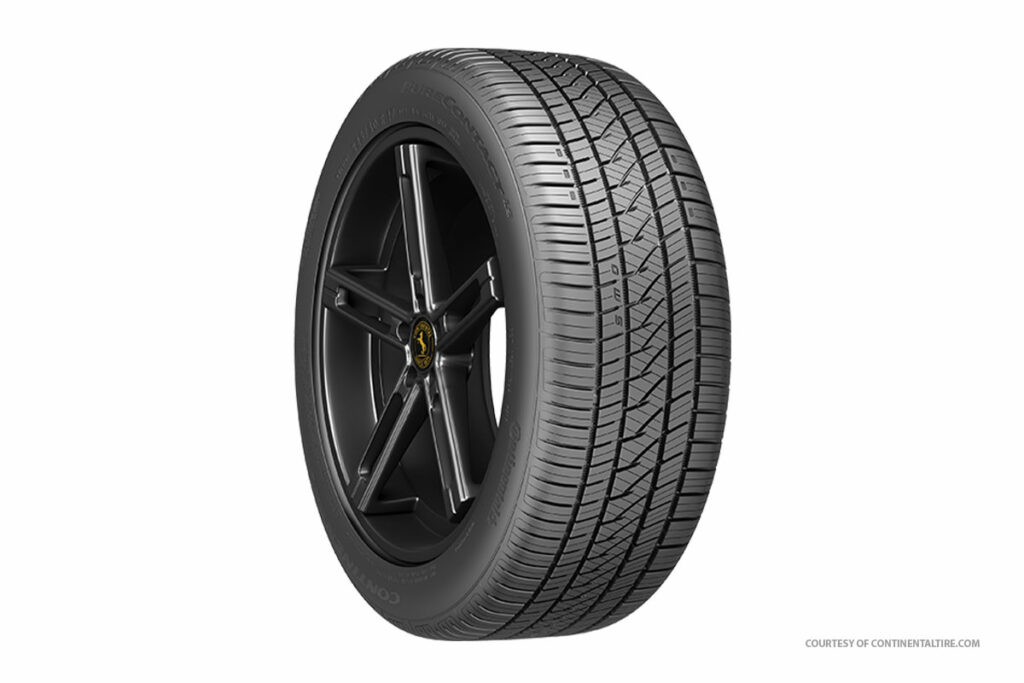
Smart design features are the hallmarks of the Continental PureContact LS. The traction grooves are designed to offer enhanced performance on snowy roads (though still not comparable to winter tires), and the EcoPlus system built into them provides traction when roads get wet.
They’re surprisingly quiet, too, likely thanks to the work Continental put into reducing noise creation by 50% compared to the previous generation of the tires.
Price: $339.47
Rating: 4.8/5
Michelin Pilot Sport A/S – Best High-Performance All-Season Tire
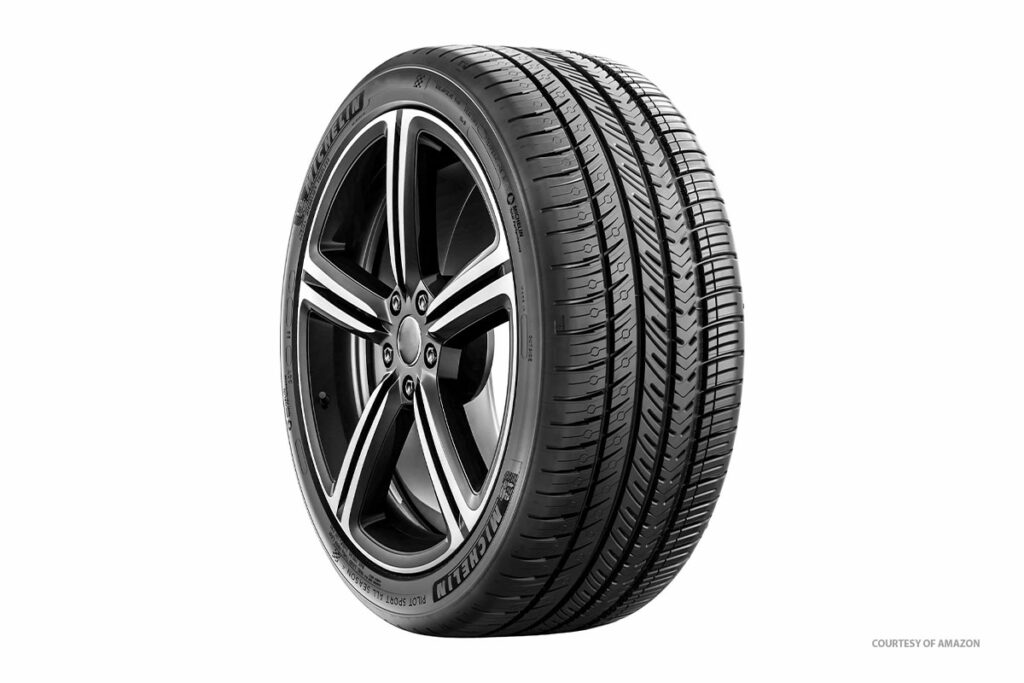
The use of the word “Sport” in the name should tell you that these all-season tires come closer to summer tires than winter ones. That’s not to say they’re useless in wet or cold weather – you just won’t get the most out of them performance-wise.
They incorporate Michelin’s “Dynamic Response Technology,” which is a fancy way of saying they give you better control of your car. That comes into its own on dry roads when you’re burning rubber.
Price: $360.19
Rating: 4.6/5
General Tire AltiMax RT43 – Best Budget All-Season Tires
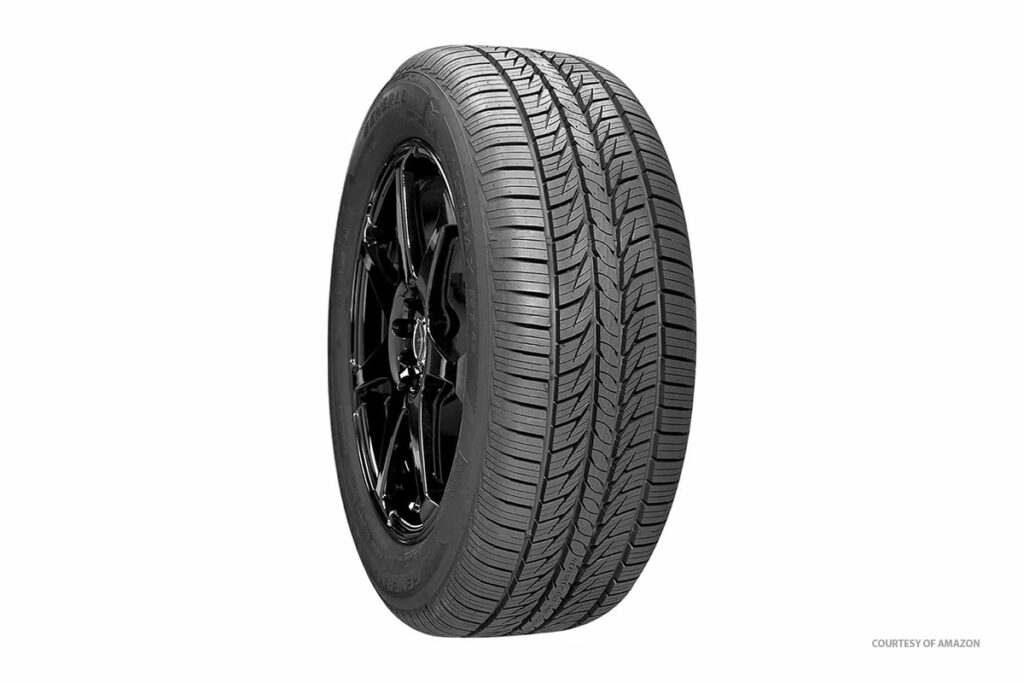
Cheap and cheerful are the operative words for the AltiMax RT43 all-season tires – they’ll set you back less than $100 per tire in most cases. And despite this low cost, they’re surprisingly high-quality. The anti-slip tread design gives you more traction when the roads get slippery, and they offer decent ride comfort.
Just be aware that they may not offer the level of traction needed to handle icy or snowy roads, putting them behind several of the options in this list in that respect.
Price: $95.71
Rating: 4.5/5
Goodyear Assurance ComfortDrive – Best All-Season Tires for Ride Comfort
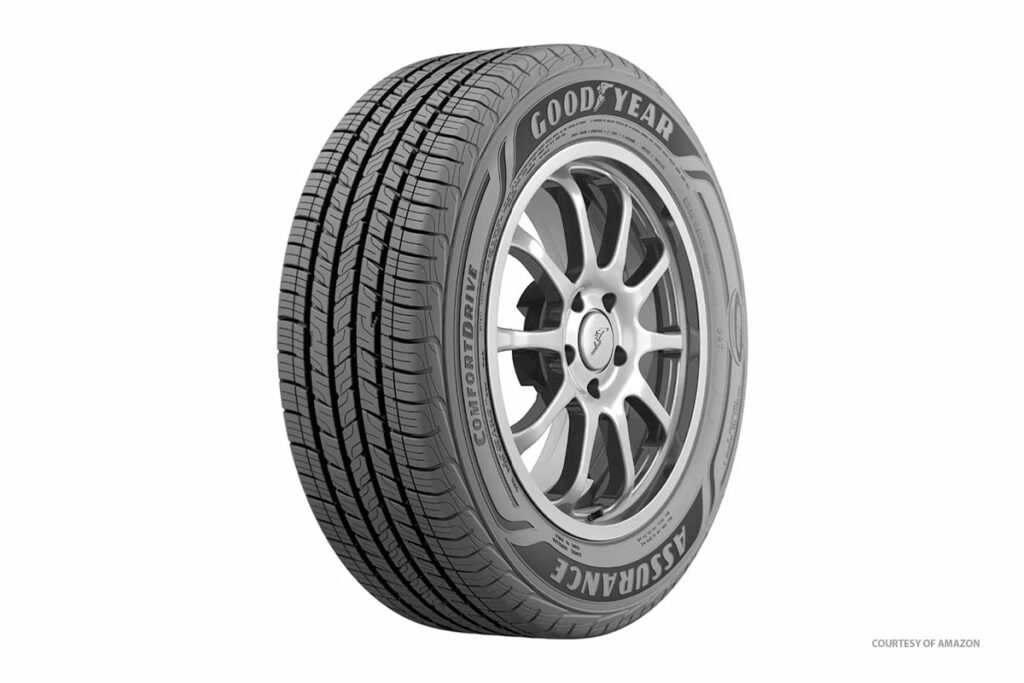
Comfort by name and comfort by nature is what you get with Goodyear tires, which are specially designed to offer a smooth ride. That design work starts with the ComfortFlex technology – a collection of smooth bumps built into the tires to minimize road vibrations.
Interlocking features strengthen the ribs to offer better response times, too, making these a good choice for conditions that make handling harder. But ironically, the comfort that gives them their name can also eliminate road vibrations to the point where you almost feel like you’re floating over the road.
Price: $209.97
Rating: 4/5
Goodyear Assurance WeatherReady – Best All-Season Tires for Winter Driving
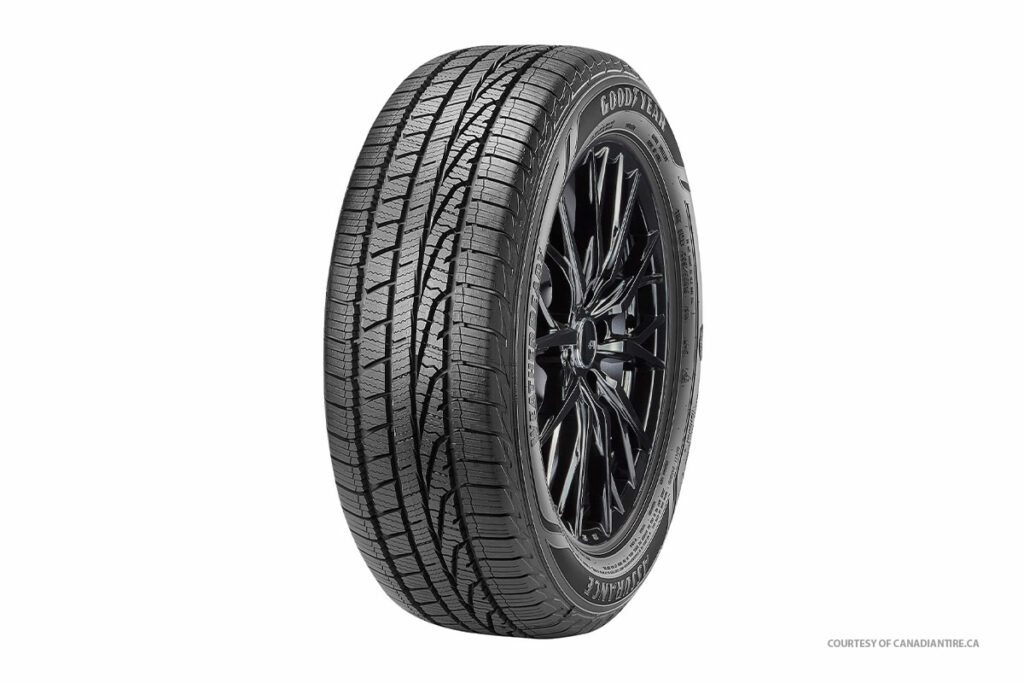
Goodyear’s second entry into this list stands out because of its clever traction technology. That starts with the asymmetric tread designed to handle uneven road conditions (such as those caused by clumped snow) and continues with the Evolving Traction Groove tech. That feature essentially makes the tires malleable, simulating the creation of new tread as the old wears away.
Unfortunately, they’re slightly prone to pressure issues – not ideal if you’re intending to use them as replacement for your winter tires.
Price: $207.97
Rating: 4.7/5
Michelin LTX M/S 2 – Best All-Season Tires for Heavy Vehicles
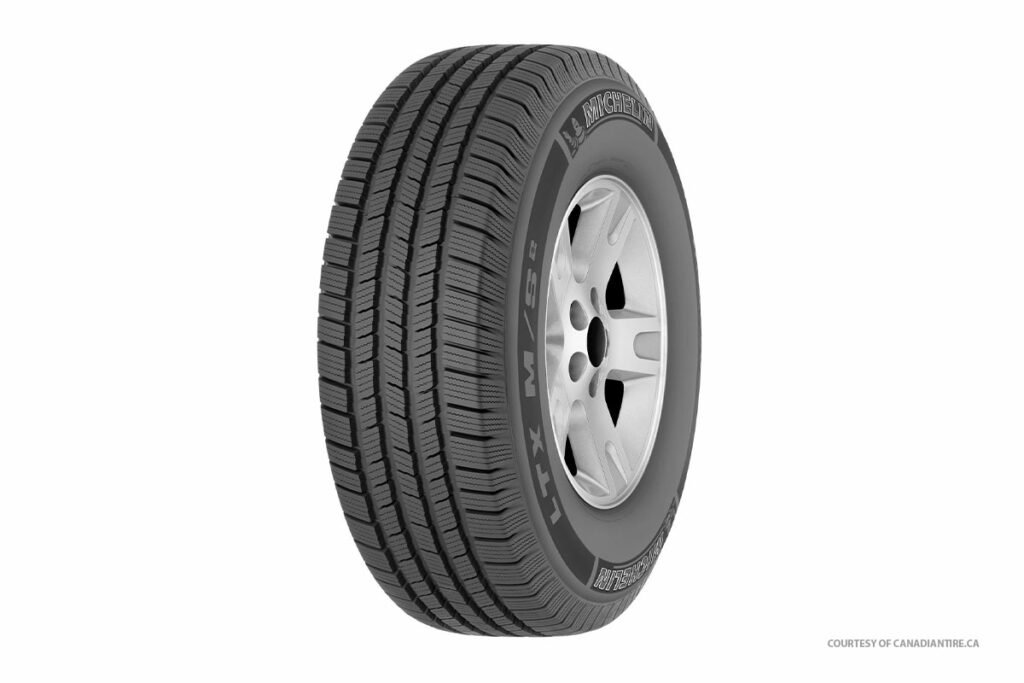
A bit of beefiness is what you need when searching for the best all-season tires Canada offers for heavier vehicles, like trucks and SUVs. Michelin’s LTX M/S 2 range delivers with a tire that has a steel belt built into it to ensure it’s capable of supporting the weight of larger vehicles as they traverse difficult conditions.
Grip is also a priority – the tires have deep grooves built in that channel water away so slickness is rarely a problem. And when combined with the sipes and micro-pumps built into the tire – all of which serve the same purpose of funnelling water away – you get all-season tires that excel in wet conditions.
Price: $293.49
Rating: 4.6/5
Michelin Defender 2 – Best for Longevity
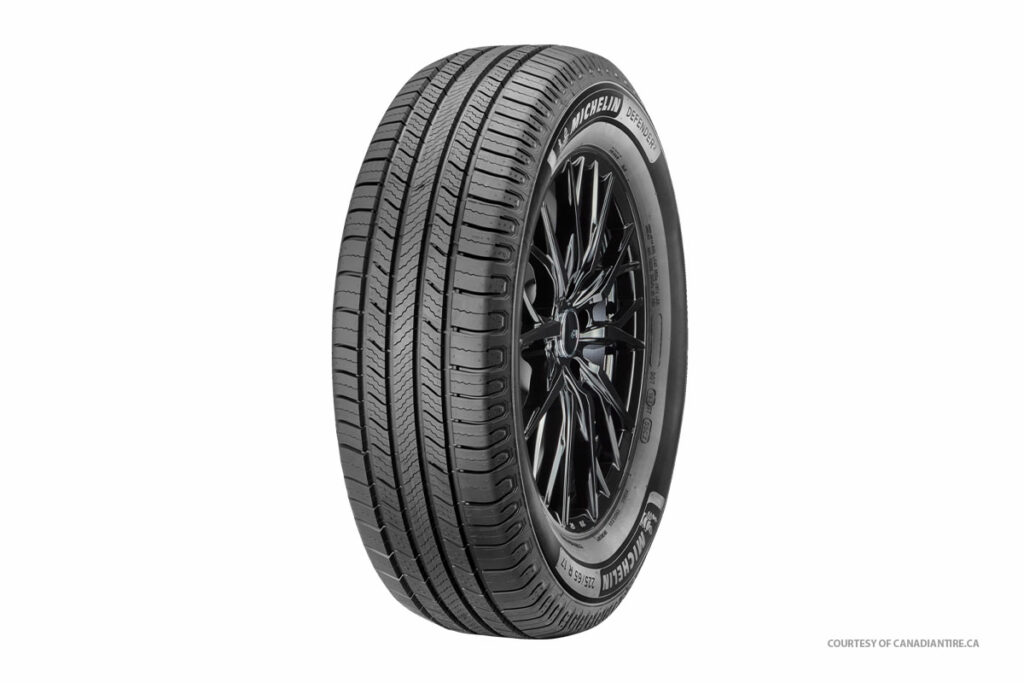
Michelin plants its flag early with the Defender 2 range by pointing out that they outlast three of its leading all-season tire competitors by an enormous 25,000 miles (approx. 40,233km) in special tread tests. The company says that gives you two years of extra tread life, though the reality is the exact number will vary depending on terrain and usage. Still, the tires have excellent longevity for a decent price, ideal for budget-conscious drivers.
Everything else about them is solid, though not spectacular, from their tread to ride comfort.
Price: $201.99
Rating: 4.6/5
Michelin Energy Saver A/S – Best for Fuel Efficiency
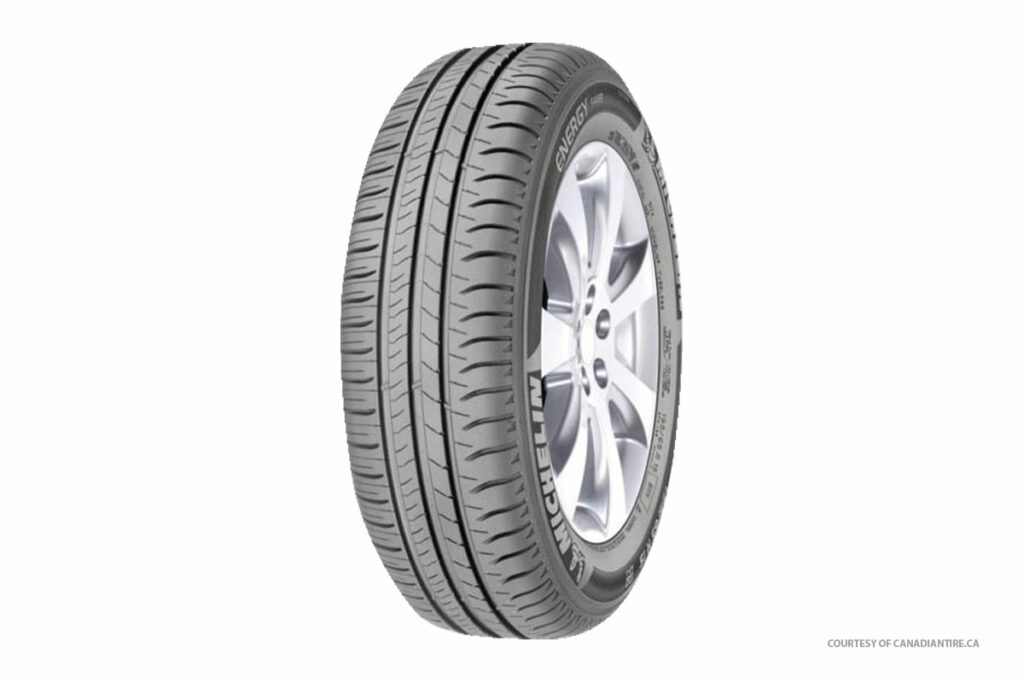
Another entry from Michelin (showcasing the tiremaker’s status as the best in the business), the Energy Saver A/S focuses more on cutting your ongoing costs than it does on handling all types of weather. The manufacturer claims them to be up to 8% more fuel-efficient than its competitors – important given Canada’s rising fuel prices – and comes with an assurance from Michelin that they’ll go for about 25,000 more kilometres than other brands.
They are a touch noisy, despite Michelin claiming that they offer a quiet ride. And some users have found that they tend to wear out after about 30,000km, which puts the claims of being able to drive more than 25,000km above other brands into question.
Price: $198.49
Rating: 4.2/5
When Can I Use All-Season Tires in Canada?
The term “all-season tires” is something of a misnomer in Canada because you aren’t always legally able to use these tires for all 12 months of the year. Regulations vary – each province has different rules that are often dictated by the severity of the winters those provinces experience. So, before spending any more time looking for the best all-season tires Canada has, it’s worth knowing when you can use them legally.
The following table breaks down the regulations by province:
| Province | Regulations |
| Alberta | Though the province of Alberta recommends winter tires during the colder months, it’s not a legal requirement. So, you won’t be punished for using all-season tires at any point. |
| British Columbia | British Columbia requires all vehicles to have either winter tires or snow chains equipped between October 1 and April 30. Furthermore, all-season tires must have a minimum tread depth of 3.5mm if you opt for the chain route. |
| Manitoba | All-season tires are fine to use at any point in Manitoba as long as they have 1.6mm of tread depth or more. However, the province recommends a tread depth of 4.8mm during winter. |
| New Brunswick | The province specifically tells you not to rely on all-season tires during winter and allows drivers to use studded tires between October 15 and May 1. So, it’s best to replace your all-season tires with winter-ready ones during that period. |
| Newfoundland and Labrador | This province encourages, but doesn’t legally enforce, the use of winter tires. So, you can use all-season tires year-round, though you’re allowed to use studded tires between November 1 and April 30. |
| Nova Scotia | Nova Scotia doesn’t make winter tires mandatory, so you can use all-season tires at any point. |
| Ontario | You’re not legally required to use winter tires in Ontario, even in the colder northern regions, making all-season tires permissible for the full 12 months. Still, the province points out that these types of tires tend to start losing grip when the temperature drops to 7 degrees Celsius or below. |
| Prince Edward Island | You’re not legally obligated to use winter tires in Prince Edward Island, so you can use all-season tires during the winter. However, the province allows (and recommends) the use of studded tires between October 1 and May 31. |
| Quebec | All-season tires are legal in Quebec as long as they’re not used between December 1 and March 15. The province’s harsh winters require the use of specialized winter tires, with all-season tires typically not providing the appropriate tread depth. |
| Saskatchewan | You can legally use all-season tires during winter in Saskatchewan as winter tires aren’t legally required in the province. |
Beyond these provincial restrictions related to winter, there’s one more thing to consider when using all-season tires – car insurance benefits. You’ll often find that insurers ask if you use winter tires on your car, with many offering rate discounts if you do. So, you may want to switch out your all-season tires to winter ones, even in provinces that don’t legally require them, to take advantage of lower premiums.
